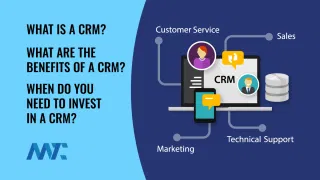A significant shift in customer behavior has impacted many industries in recent years, but the e-commerce sector has been hit the hardest. Digitally savvy customers have gravitated toward a personalized approach, touchless shopping experience, and multichannel interactions.
These factors are pushing online retailers to adopt additional systems to assist them in managing customer relationships and ensuring a personalized experience in the face of fierce competition.
In the case of new customers, it is necessary to gauge their needs and preferences and establish personalized connections to avoid getting them swayed to your competitors. At the same time, discovering their buying, viewing and purchase history helps provide relevant recommendations and ensure their retention. All this requires collecting, storing, processing, synchronizing, and managing a vast amount of customer data.
One of the solutions worth considering is the customer relationship management system, or CRM in short.
Around 91% of businesses with 10+ employees leverage CRMs in their workflows.
Grand View Research
Companies of various sizes implement ecommerce CRM for:
- Customer management automation
- Multichannel interactions enablement
- Building a complete picture of the customer
- Marketing and service process automation
- Designing a single customer management center for streamlined cross-departmental data visibility
How E-commerce CRM Solutions Can Address Your Business Needs
CRMs are typically holistic solutions embedded into an e-commerce architecture in order to meet the following needs:
- Operational needs – Effective customer management is rather challenging and, in most cases, impossible without a single credible data hub. As a result, online commerce businesses resort to deploying CRM systems to connect multiple touchpoints to collate customer information into a common data repository and ensure unimpeded data access for various departments.
- Analytical needs – CRMs can use the gathered data to generate insights for informed decision-making. The system uses the collected financial and marketing customer data such as search queries, views, and purchase history to create detailed profiles, forecast behavior, generate recommendations, increase customer satisfaction, and enable cross-selling and upselling.
- Collaborative needs – The disconnection of departments can harm the productivity of workflows. To enable unified access to customer data for marketing, sales, and other departments, you need a single system that can simplify data exchange and access. The e-commerce CRM can provide a single customer profile access, seamless cross-department cooperation, and ensure company-wide synergy.
Ecommerce CRM for B2B and B2C: Benefits
No matter what size your e-commerce company is, and whether it’s B2B or B2C, the main goal is to attract, convert and retain customers. CRMs are developed to assist companies in achieving these goals by providing them with the following benefits:
- Complete customer view – Effective customer management tactics start with profound customer research based on accumulated data. CRMs can assist online retailers in gathering data and, based on it, design a 360-degree shopper profile. The access to the customer view across departments allows for the proper sales funnel management, customer shopping journey visibility, activity tracking, development of targeted marketing strategies, and providing appropriate recommendations.
- Advanced personalization – CRMs with an in-built machine learning can leverage the gathered customer data to act on upselling and cross-selling opportunities, enable recommendations, and simplify shopping experiences. Such a personalized approach helps bring in customers and grow retention and loyalty rates.
- Multichannel customer experience – Today’s opportunities for omnichannel interactions let customers be more flexible in their purchasing, be it through mobile or web stores or social media. Meanwhile, for digital retailers, providing flawless and personalized experiences in the multichannel environment causes significant challenges related to linking multiple touchpoints and gathering cross-channel customer data into a unified hub. CRM can transform fragmented customer experiences into a single one that brings multiple channels together and ensures all data is in sight, and the user will receive a personalized experience through any channel of interaction.
- Automation of marketing operations – The marketing CRM capabilities imply the control over the customer interactions during the sales journey, marketing tasks automation, the creation of tailored marketing campaigns, and opportunities for customized service with chatbots and automated responses. Automating marketing tasks and understanding customer behavior results in more effective lead nurturing, revenue growth, and a more personalized approach across the customer shopping journey.
- Future-oriented analytics – CRMs act as customer data repositories that gather, store, and use the data to make grounded decisions. Thanks to this single source of truth, the data can be used for generating customers’ detailed profiles, estimating the level of their engagement, predicting behavior, and identifying the stage within the sales pipeline to timely apply marketing tactics and offer relevant recommendations. What is more, the system can identify valued shoppers and the best channels for their acquisition to provide you with the appropriate recommendations related to further effective actions.
Acquiring a CRM solution may turn out to be the right way to automate customer management, offer a personalized approach, boost retention and overall business performance. Moreover, by flawlessly integrating with other modules of your e-commerce architecture, a CRM solution can effectively complement the functionality of the entire ecosystem.
